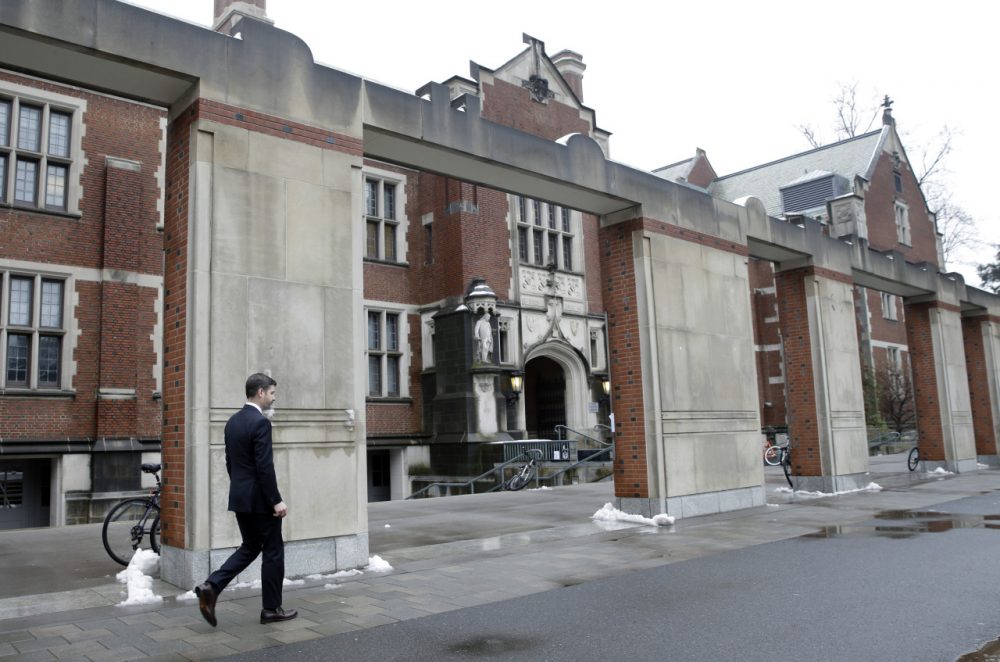Advertisement
Economists Examine Impact Of Grade Inflation At Wellesley
Resume
You know that place where all the children are above average?
Sorry, Prairie Home Companion fans, we're not talking about Lake Wobegon, we're talking about American universities.
Since 1990, the most commonly awarded grade at a four-year college has been an A. Grade inflation is rampant and still inflating.
But that's not the reality everywhere. Boston University has spent years cracking down on inflated grades, and so has Princeton. Wellesley College worked to tamp down grade inflation a decade ago, and now economists have dug into the data to find out what impact grade deflation has had at Wellesley, and they've found some positive outcomes.
Guests
Akila Weerapana, professor of economics at Wellesley College and co-author of a new study on the impact of grade deflation.
William Deresiewicz, author of "Excellent Sheep: Miseducation of the American Elite and The Way to a Meaningful Life." He tweets @WDeresiewicz.
Highlights
On how Wellesley rolled back grade inflation:
Akila Weerapana: "Wellesley adopted a policy that said...in 100- and 200-level courses, which are introductory and intermediate level courses, that had more than 10 students enrolled in them, the average grade could not be higher than a B+. This was a rule which didn't have...very stringent enforcement in the sense that a professor was free to give a grade that was higher than that provided that they then submitted an explanation to the dean saying something like, 'This was an extraordinary group of students who received a higher grade than the policy would say that they should.'"
On the impact of grade "deflation" on course popularity:
AW: "The adoption of this policy did have impact on students' decisions to take courses in the humanities and major in the humanities in the sense that we see some decreases in both of those — in both enrollments and majors. The movement hasn't been necessarily towards moving from the humanities into the hard sciences...If you think of economics as sort of the in-between stop along the way...the quantitative social sciences probably have picked up most of those enrollments."
On concerns about graduate school competitiveness:
AW: "I think that is a very active concern among students. We don't provide any empirical evidence in this paper, we have looked informally at some data on student satisfaction, with their education at Wellesley College, with alumni giving, medical school admissions, things like that. We haven't found strong evidence, but it is an open question and I think probably this question of 'unilateral disarmament' is a significant challenge. I think there's some other issues with...the system that Princeton has where you mandate a certain grade distribution — that goes, I think, beyond the unilateral disarmament. [College students] do not want to be told that...they're not getting an A because there's only so many As that can be given out, or that they're getting a C because so many Cs have to be given out. I think a policy like Wellesley's, which doesn't sort of mandate a particular distribution tends to be more accepted by today's college student than a mandate of grade distribution."
On what grades measure in students:
William Deresiewicz: "What kind of student is the college trying to produce? How does it relate to its students? ...There's a larger historical context — grade inflation has been going on since the 60s, it leveled off in the 70s — late 70s and 80s — it's been soaring again. And especially that second rise, since 1990, clearly seems related to a big change in the way colleges and universities relate to their students. They now have a customer service mentality and, as you know, the customer's always right. And you're supposed to keep the customer happy and it's quite telling in that respect that grade inflation is much worse at private colleges than at public ones and worse still at elite private colleges where A.) People are paying a lot of money and feel that they deserve an A in return and B.) It's full of kids who've always gotten As, who always expect to do well, who increasingly are going to college because they want to be passed up to the next level of the elite hierarchy, you know? 'I want to go to law school, I want to work for Goldman Sachs, don't screw this up for me.' That's a very big factor here and this issue of unilateral disarmament obviously plays into it."
On everyone being above average:
AW: "It is a big problem and people talk about, sort of, more narrative evaluation system but those of us who've been reading letters of recommendation know that there's been inflation in those narrative instruments as well. So, one of the things I tell my students is... 'In the end, you have to convince people that you can do a good job for them by the work that you do.' And so the real pressure here is the entry-level position and that's where this credentialism, I think, becomes a big factor."
More
Vox: What Wellesley Learned When It Stopped Giving Out So Many A's
- "A C grade really once was average, or at least typical: In the 1960s, it was the most commonly awarded grade in college courses. Not anymore. By 2007, 83 percent of all grades at a sample of 200 four-year colleges and universities were A's and B's."
This article was originally published on September 02, 2014.
This segment aired on September 2, 2014.